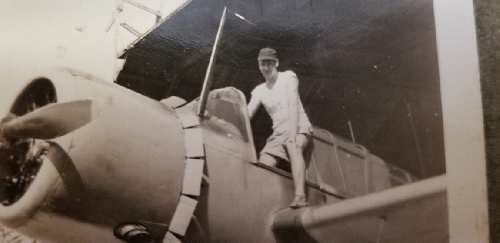My father was born in 1920, in Springfield, Ohio. His father worked in one of the six steel mills in town. They had no union to protect them, and they had no healthcare plan. If you were injured on the job that was your own personal problem. You were off the payroll when your feet left the property. He attended local schools and said his shop class built tables and chairs for the kindergarten. Practical and resourceful yes, but safe?
Dad's first job was picking up bottles for bootleggers at five cents a bottle. One day he pulled his wagon up the drive and knocked on the door. A policeman answered, and he turned his wagon around and went it search of another bootlegger. That's how hard it was to find a bootlegger"a child could do it. He also remembered the Great Depression. He was in a food riot and ran away from home as a teenager. He spent the summer riding trains being a hobo. He was always quick to tell me, a bum doesn't want to work a hobo doesn't want to work anymore than is necessary. He enjoyed the lifestyle and envied their freedom but returned to high school graduating in 1939.
He said when FDR said, "this generation has a rendezvous with destiny," he knew what that meant, and he knew it was directed at him. But he'd landed a job as an apprentice draftsman. He was learning a trade and the job was draft deferred they were building machine tools for the B-26 bomber. He heard the news about Pearl Harbor that Sunday afternoon and knew what that meant as well. He enlisted in the Army Air Corps before Christmas.
When they took their physicals, my father failed his Wizz quiz. High uremic acid meant possible kidney stones and so he was grounded before he ever got off the ground. Upon hearing the news, my father said, "If I can't fly, I'm not staying." It was then explained that he had signed the paperwork and had been inducted into the Army. The old man had an ace up his sleeve with twelve million men being drafted he knew they wouldn't be chasing anyone who enlisted in another service. After his physical he walked down the street to the Navy recruiter and signed up again. When it came time to take the Wizz quiz my father asked the guy next to him, "fill this for me" and became a naval airman candidate.
He was sent to Chicago to the Great Lakes Naval Training Center. It was while he was in Chicago that he met my mother. From there he was sent to Lakehurst, New Jersey, for flight training. Lighter than air flight training. He had dreamed of flying Hellcats off carrier decks but ended up flying a blimp instead. Officially, he was the flight engineer, but they flew twenty-four-hour missions, so everybody had a turn at the wheel. They were flying over the Atlantic looking for U-boats they had radar and could stay aloft while airplanes could only fly for a few hours at a time.
When FDR died, he cried. He was nearly twenty-five years old and FDR had been President since he was twelve. My father had survived the Great Depression and was about to survive the Second World War. Under the G.I. Bill he took his discharge papers and his high school diploma to The Ohio State University and enrolled. He was given a voucher for the bookstore and he was in. He and my mother along with a baby lived in a twelve-foot Burro trailer for four years. Graduating in the class of 1950, he was firmly established by the time I came along.
More at: https://carbonbaselife.car.blog/2020/05/25/a-hobo-child/






